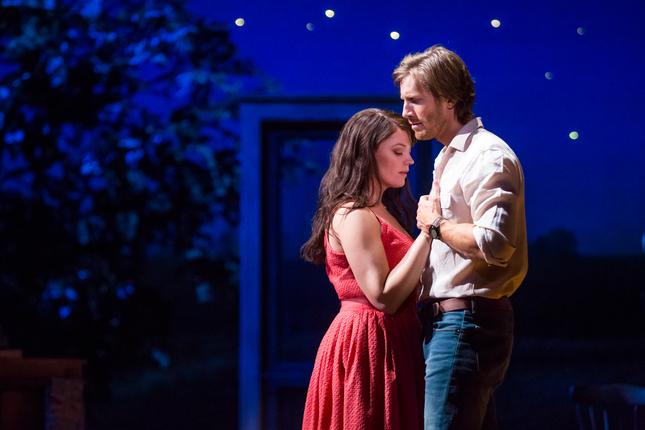Francesca and Robert in Iowa, Set to Music
By • July 5, 2016 0 952

If there’s one thing in the DNA of most arts critics, it’s a vivid aversion to sentiment — honest or not — and schmaltz. Schmaltz is that wonderful Yiddish (and, without the t, German) word that means both animal fat and, in music and drama, an overly cloying sweetness or melancholy, tear-inducing sadness — especially when present in overly familiar material, God bless us every one. Sentiment is to us admirers of dark matter what the first ray of dawn is to vampires, something to be avoided and belittled at all cost.
I confess to a certain bias here. I am not averse to a little honest (as opposed to, I suppose, dishonest) sentiment. Even the use of schmaltz as a theater tool doesn’t necessarily prod my nose upward or give me intellectual vapors. After all, Thornton Wilder’s “Our Town” has a reputation for sentimentality in some circles, probably because it’s been performed by thousands of high school theater groups. But it also proves sentiment can exist within the core of what is essentially a diamond-hard work of art about the nature of human existence.
The musical version of “The Bridges of Madison County,” at the Kennedy Center’s Eisenhower Theater through July 17, is fraught with schmaltz, to be sure. It also brings with it the baggage of its previous incarnations as a hugely — and mysteriously — successful little best seller by Robert James Waller and as a movie with Clint Eastwood passing off his flintiness as overpowering sex appeal and Meryl Streep sporting another impeccable accent.
The musical — with music and lyrics by the gifted composer Jason Robert Brown, who also conducted the first week of performances here — is neither the book nor the movie. It’s a stand-alone that stands taller than its source materials, an imaginative staging of narrative in musical form. As such, it was a relatively moderate but critically praised success on Broadway, retelling the basic story with verve, style and originality.
It’s still the same story, set in early 1960s Middle American farm country in Iowa, with much of the attendant clichés that such a setting engenders. We find a stoic woman named Francesca, who was rescued by an American soldier from a struggling existence in post-war Naples and brought to America to be his wife, raise two children and become a part of a farming community, the values of which are amply and simply illustrated.
Along comes Robert, a National Geographic photographer who is crossing the country taking pictures of old bridges (the town apparently has one). He’s thin, tall, rugged but sensitive, just short of a hippie, a vegetarian no less. He finds Francesca alone, tending to farm and town things, her husband and two children having gone off to the state fair, where daughter Carolyn is showing a prized steer.
Francesca and Robert connect, if not instantly, at the speed of a rapid-beating heart, which leads to their falling into bed, at first reluctantly, then with full-throttle passion, as beautifully charted in “Falling Into You,” one of Brown’s soaring, searing ballads.
How this all works out and how you feel about it and respond to it as story and situation depends entirely on you, but here’s something self-evident: everyone involved in the project seems devoted to it; it’s musical theater as a community effort. The performers — all of them — raise the characters — all of them — to the level of people we recognize as having lived and living. Everything — but especially the music, it should be said — adds to the proceedings. The sets are sparse, but suggestive of town and country, the bridges more imagined than real, rooms and interiors detailed as a gathering up of keepsakes.
This is a musical as genre, but Brown’s music isn’t exactly typical, and it’s a major part of things, with little room for conversational talk. It enriches the proceedings and showers the scenario with emotion and affection. His score is versatile, too. He seems to know how these people might sound, and sometimes he pops out with an upbeat, almost bluesy, gospel sound that feels entirely appropriate to them.
Having playwright Marsha Norman taking care of the book helps enormously. She wrote the scathing “’Night, Mother” and the book for the musicals “The Secret Garden” and “The Color Purple.” No fan of mawkishness, she keeps things grounded.
This is a narrative without a villain; the local busybody, played smartly and with not-too-broad humor by Mary Callanan, turns out to be a loyal friend to Francesca. The hard-working husband Bud gets three songs to state his case as a sturdy Midwesterner married to his wife and to the land.
But in the end Francesca and Robert have to be believable, understood and likeable, because it’s their story. Mostly, it seems to be Francesca’s story — the immigrant woman who misses her homeland but is tied to her home and family. Both Elizabeth Stanley as Francesca and Andrew Samonsky are convincing and sing beautifully and with authority. Stanley uses Francesca’s accent to dry, humorous effect, but you can see, bit by bit, the fire lighting up within her, and, later, the pain of the choices she has to make. “Bridges” may be musically and stylistically almost operatic, but Stanley’s Francesca, musically, dramatically and persona-wise is wholly natural.

